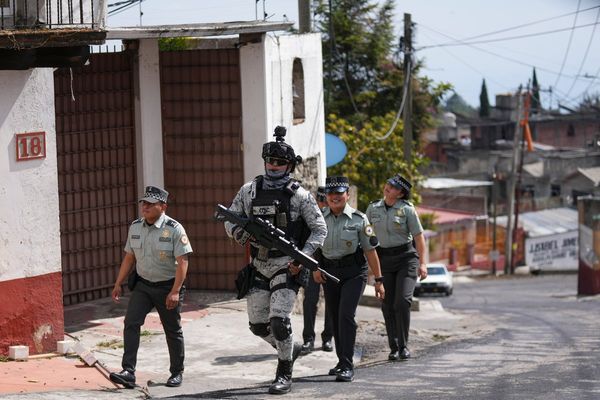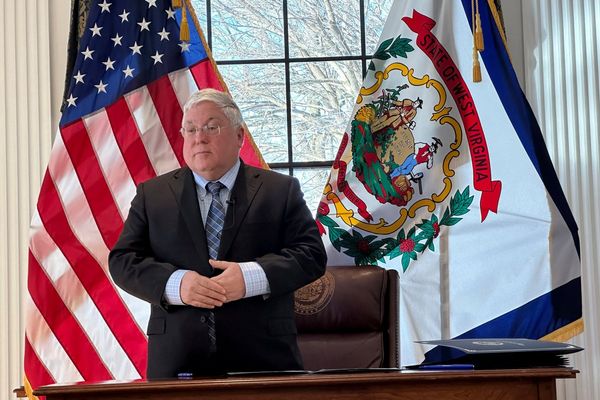Ron DeSantis ran for governor promising to make civics education a priority in Florida’s public schools. He’s fulfilling that by pushing reforms to celebrate “the success of the United States” and to ensure no one is “teaching kids to hate their country.”
But critics see his efforts as injecting “highly partisan” and “highly biased” content into the curriculum, with an inappropriate dose of religious values.
They don’t like that proposed academic benchmarks ask students to understand “the influence of the Ten Commandments” and identify “disorderly protesting” as a characteristic of “irresponsible citizenship.”
DeSantis’ education commissioner, Richard Corcoran, added fuel to those complaints when he spoke earlier this month at Hillsdale College, a conservative Christian school in Michigan tapped to help Florida revamp civics lessons. Corcoran said his goal was to “keep all of the crazy liberal stuff out” of state classrooms.
Entwined with the civics push is a new proposed state rule that would keep teachers from trying to “indoctrinate” students. The rule, DeSantis and Corcoran have said, is their way to ban critical race theory. It’s an academic idea that isn’t taught in Florida schools but has become a hot-button political issue nationwide, with GOP leaders in about a dozen states this spring pushing to ban it.
DeSantis’ criticism of critical race theory and his move to revise civic lessons mimics the playbook of former President Donald Trump. Before he left office, Trump formed the 1776 Commission to “restore understanding of the greatness of the American founding” and push back against The New York Times’ 1619 Project, which sought to “reframe” American history by putting slavery “at the very center of our national narrative.
Last week, DeSantis called critical race theory a way of “teaching kids to hate their country and hate each other.” It is based on “false history,” he said, speaking at a news conference in North Florida, “when they try to look back and denigrate the founding fathers, denigrate the American Revolution.”
Not true, said Michelle Jacobs, a law professor at the University of Florida, who teaches a class in critical race theory. “It’s a talking point. If they understood what it really is about, they couldn’t legitimately object to it being taught.”
Critical race theory, as explained by the American Bar Association, is a collection of ideas first developed by legal scholars decades ago. It views racism as “embedded within systems and institutions, like the legal system, that replicate racial inequality.”
But some of its ideas can and should be used in public schools, if that means that history is taught by “pulling the camera back” and considering what happened to all people, not just white people historically discussed, Jacobs said.
That means an end to the “American mythology” that its founders were perfect people, she said. It means teaching that Thomas Jefferson was the primary author of the Declaration of Independence but also owned enslaved people.
“It shows students that managing a democracy is complicated, and it’s hard and you can make mistakes. So why would we deny our students the ability to understand that about our own history?” she said.
The DeSantis administration’s new civics standards take another view, aiming to provide lessons rooted in “American exceptionalism” that will instill civic pride in students, according to the Florida Department of Education.
Well before DeSantis was elected, civics was a required middle school course in Florida, often taken in seventh grade, and U.S. history and government were required in high school. Students must take state civics and history exams when they finish those courses.
DeSantis has said he wants to make those lessons better and to have 12th graders take a civics test, similar to what aspiring U.S. citizens must pass, before they leave high school.
First draft draws boos
But the first draft of new civics standards released last month prompted criticism.
As a result, the education department is now revising that draft, said Stephen Masyada, interim executive director of The Lou Frey Institute at the University of Central Florida.
“They are being responsive to the public input and feedback,” said Masyada, who is also director of the Florida Joint Center for Citizenship, which is involved in the review of the new standards.
“We seek input from everyone across a broad spectrum of individuals, groups and other stakeholders,” said Cheryl Etters, a department spokeswoman, in an email.
The only draft publicly available, however, is what was released the week of April 5, and most of the comments sent to the department criticized it.
Some disliked standards that said students must learn why “the Electoral College is essential,” to “compare the success of the United States to the success or failure of other nations with regard to their governing philosophies” and “identify Judeo-Christian values ... in founding documents,” among others.
Comments included:
“Please remove the reference to religious values in civics. There is no reason to include the 10 commandments and the Hebrew Bible and Judeo Christian values and the Protestant work ethic (are we insinuating that other groups don’t have work ethics?)”
“Please edit ... to reflect that the Pledge of Allegiance and the National Anthem are not the only forms of patriotism.”
“More politically motivated than educational.”
“Please stop telling the students what to believe when comparing the US to other nations. It is acceptable to compare nations but the students should come to their own conclusions. It is our job as educators to teach children how to think, not what to think.”
The Florida Association of Social Studies Supervisors, which includes public school teachers and curriculum experts, asked the state to hold off its adoption of the new standards. In a five-page letter sent in late April, the association said some of the revisions added too many topics to some classes or offered benchmarks that were unclear.
“Numerous benchmarks K-12 ... ask students to recognize or explain how something distinguishes the U.S. from other nations when in fact that characteristic is not unique to the U.S,” the letter said.
The revisions to Florida’s civics standards have been in the works since 2019 when the state passed a new law requiring updates. The state Board of Education, whose seven members are all gubernatorial appointees, has the final say and could vote on the standards in July.
June 10 vote on rule
The proposed rule about instruction, which the state board is to vote on June 10, became a topic of public discussion only this month.
During his speech at Hillsdale College, Corcoran said the rule would help combat critical race theory, though he acknowledged the topic wasn’t in Florida’s academic standards.
“It doesn’t say critical race theory but you could definitely have a teacher who teaches critical race theory,” he said.
The proposed rule doesn’t mention the theory either but says “instruction on the required topics must be factual and objective, and may not suppress or distort significant historical events ... and may not define American history as something other than the creation of a new nation based largely on universal principles stated in the Declaration of Independence.”
It goes onto say that teachers may not “share their personal views or attempt to indoctrinate or persuade students to a particular point of view that is inconsistent” with state standards.
Teachers need that oversight, Corcoran said.
“You have to police them on a daily basis,” he said, calling it a “constant vigilant fight.”
Andrew Spar, president of the Florida teachers union and a former Volusia County teacher, said teachers don’t need policing.
“I think that is insulting to our teachers who every day do their job above reproach,” said Spar, president of the Florida Education Association.
“The big concern we have for all of this, this all seems to be politically motivated,” Spar said. “Indoctrination is a political word ... and it’s a trigger word.”
A high school history teacher who emailed state leaders asking them not to adopt the rule agreed.
“I can assure the state that there is no ‘indoctrination’ of students going on,” the teacher wrote. “We teach our students to critically think about the events of the past in order to help them make their own conclusions about events happening today.”
_______







